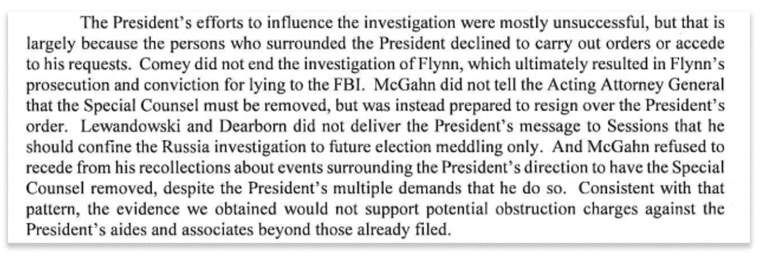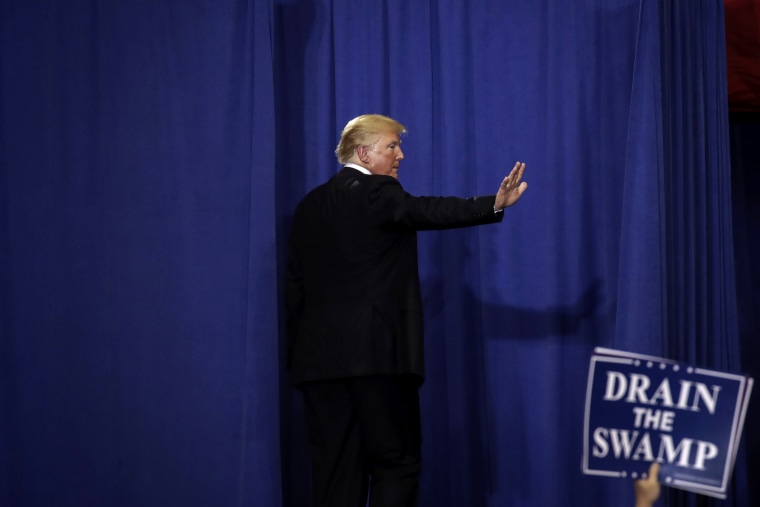Had President Donald Trump been left to his own devices, the findings in special counsel Robert Mueller's report released Thursday would have likely been far more damning for him.
Instead, the Mueller report makes clear, Trump's "efforts to influence the investigation were mostly unsuccessful" — but only "largely because the persons who surrounded the President declined to carry out orders or accede to his requests."
Among the figures referred to by Mueller who refused Trump's wishes were then-White House counsel Don McGahn, former campaign manager Corey Lewandowski and then-Attorney General Jeff Sessions.
"Our investigation found multiple acts by the President that were capable of exerting undue influence over law enforcement investigations, including the Russian-interference and obstruction investigations," Mueller's report said.
"The incidents were often carried out through one-on-one meetings in which the President sought to use his official power outside of usual channels," the report continued. "These actions ranged from efforts to remove the Special Counsel and to reverse the effect of the Attorney General 's recusal; to the attempted use of official power to limit the scope of the investigation; to direct and indirect contacts with witnesses with the potential to influence their testimony."
Trump, the report outlined, directed McGahn to have Mueller removed as special counsel. McGahn refused, and even prepared to quit over the matter. The report explained that "McGahn ultimately did not quit and the President did not follow up with McGahn on his request to have the Special Counsel removed" — putting on hold an outcome that would likely have opened Trump up to a harsher assessment from Mueller.
Furthermore, in January 2018, after The New York Times reported that Trump had ordered McGahn to fire Mueller, Trump "sought to have McGahn deny that he had been directed to remove the Special Counsel," the Mueller report stated.
But, the report said, "each time he was approached, McGahn responded that he would not refuse the press accounts because they were accurate."

In his report, Mueller also writes that Trump, after being rebuffed by McGahn, quickly directed Lewandowski "to tell the Attorney General to limit the scope of the Russia investigation to prospective election-interference only."
According to the report, Trump dictated a message to Lewandowski in June 2017 that he wanted passed on to Sessions. The note said that Sessions should give a speech announcing he would limit the jurisdiction of the special counsel.
But Lewandowski, Mueller wrote, "did not deliver the President's message to Sessions." Lewandowski scheduled a time to meet with Sessions to deliver the message, but Sessions canceled, and then Lewandowski had to leave Washington.
One month later, Trump met with Lewandowski again and asked him if he had delivered the message to Sessions. Lewandowski said he would deliver the message "soon," and after he left the meeting, he handed the note to Sessions' chief of staff Rick Dearborn, and asked him to give it to Sessions. Dearborn told Mueller's team that the note "definitely raised an eyebrow" and never followed through — again stifling another move that may have led to bigger legal trouble for Trump.
In addition, Comey didn't end the investigation into Trump's first national security adviser, Michael Flynn, even though Trump had asked Comey in a one-on-one meeting to "see your way clear to letting this go, to letting Flynn go."
Comey's refusal to do so, Mueller noted, "ultimately resulted in Flynn's prosecution and conviction for lying to the FBI."
At other times in the report, Mueller noted similar scenarios, including Trump's attempt to get Sessions to "unrecuse himself," Trump's attempt to get Director of National Intelligence Dan Coats to say publicly that no link existed between Trump and Russia, and Trump's attempt to get then-Staff Secretary Rob Porter to reach out to Rachel Brand to discuss the possibility of installing her as a replacement for Sessions.
But in all of those instances, Trump's directives were refused, helping Mueller reach a conclusion that, when it came to obstruction, Trump was largely untouchable.
"Consistent with that pattern, the evidence we obtained would not support potential obstruction charges against the President's aides and associates beyond those already filed," Mueller wrote in the report.

